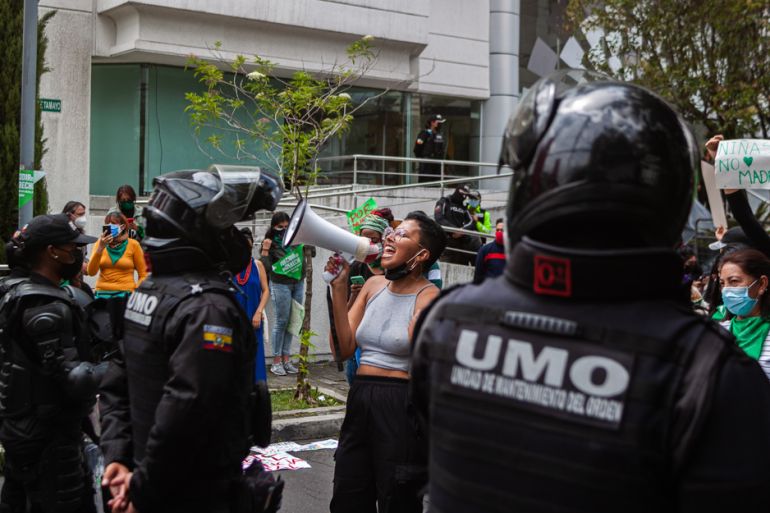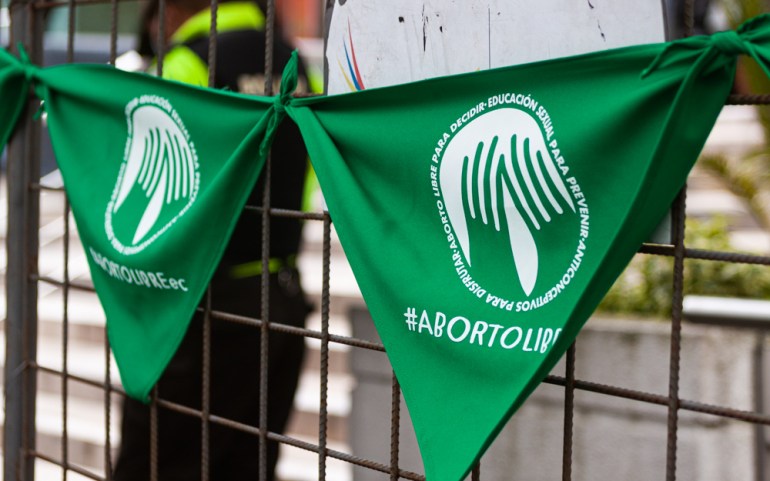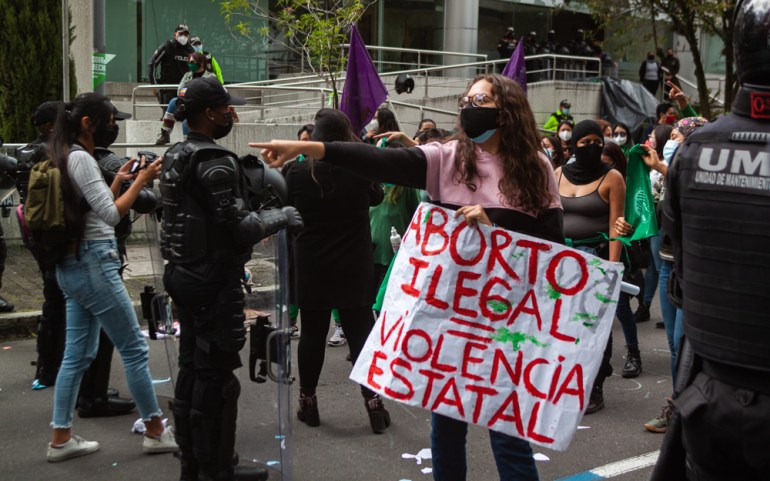Ecuador abortion rights victory hailed as latest in ‘tidal wave’
Advocates say court ruling that decriminalises abortion in rape cases is an important step, but struggle continues.

Quito, Ecuador – Women’s rights advocates have hailed a recent court ruling that will ease restrictions on abortion in cases of rape in Ecuador, the latest country in Latin America to be swept up in the “green wave” abortion rights movement.
In a 7-2 vote on April 28, the Constitutional Court of Ecuador deemed unconstitutional a previous ban that outlawed abortions except in cases where a woman’s life was in danger, or if a woman with a mental disability was raped.
Keep reading
list of 4 itemsHonduras hardened its abortion ban. These women remain undeterred
Inside Nigeria’s illegal backstreet abortion clinics
The abortion cases that could force El Salvador to loosen its ban
Previously, Ecuadorian women could face up to two years for having an abortion, while medical professionals who performed the procedure could be jailed for as many as three years.
While the court’s ruling does not legalise abortion in Ecuador – only decriminalising it in all cases of rape – it opens a path forward to expand reproductive and women’s rights in the conservative, predominantly Catholic country.
“Never again will women be threatened with jail time, preventing them from making decisions about their reproductive life,” Ana Vera, director of the women’s collective Surkuna, told Al Jazeera in an interview.
Road ahead
Practically, the decision tasks the human rights ombudsman with creating a new law within two months to present to the country’s 137-seat unicameral National Assembly, which then has six months to debate the proposed bill.
Freddy Carrion, the country’s top ombudsman, said many stakeholders – from women’s rights collectives to state institutions and medical professionals – would participate in drafting the legislation.
“There is no doubt these groups need to work together and make an effort to present a more effective law to the National Assembly,” Carrion told Al Jazeera.
On May 14, a new left-leaning National Assembly will be sworn in. While the party with the second-most representatives in the legislature, Pachakutik, is pro-choice, it is unclear what position the Union for Hope coalition, aligned with presidential runner-up Andres Arauz, will take.
But women’s rights groups are wary after the National Assembly failed to pass substantive reforms to the penal code in 2019, sparking clashes between police and pro-choice protesters. In 2013, former populist left-wing President Rafael Correa – who is Arauz’s mentor – also infamously threatened to resign if members of his own governing alliance voted to decriminalise abortion.
“We’re not willing to let this happen again, not in [President-elect Guillermo] Lasso’s government, nor any other,” said Vera. “We will be vigilant, observant and constantly demanding [the court’s] ruling be respected.”

Lasso’s response
Members of Ecuador’s pro-life movement, who were present outside the court behind a line of riot police to prevent clashes with pro-choice activists, denounced the court’s decision.
In an interview with local newspaper El Universo last week, Martha Cecilia Villafuerte, director and founder of the National Family Network, alleged the judges did not analyse the arguments from both sides transparently. Villafuerte also told the newspaper that a national referendum on the abortion issue should be held.
A 2019 report on Ecuador from Latin American Public Opinion Project found more than 63 percent of Ecuadorians believe abortion is justified when a mother’s life is in danger.
Despite being a devout Catholic affiliated with the ultraconservative group Opus Dei, Lasso – who will take up the presidency on May 24 – surprised many when he stated in an open letter that he would respect the court’s ruling.
“The independence of the government branches and the secular nature of the state are principles that cannot be negotiated,” he said in the statement.
‘Green wave’
Meanwhile, the Ecuadorian court decision comes amid a wider push in Latin America for abortion rights, with momentum especially building after Argentina in late December became the fourth country in the region to legalise abortion.
On the same day that Ecuador decriminalised abortion in cases of rape, the Dominican Republic’s Chamber of Deputies approved a new penal code that includes an article allowing abortion if a woman’s life is in danger. The Dominican Senate will vote on the proposal next.
Dominican women’s rights groups have demanded abortion in three circumstances: when a woman’s life is in danger, when the pregnancy is not viable, and in cases of rape and incest.
“Women and girls in the Dominican Republic have had a long wait for authorities to defend their lives and their sexual and reproductive rights, but the movement to end the country’s archaic total abortion ban is stronger than ever,” Margaret Wurth, a researcher at Human Rights Watch (HRW), said on Twitter.
Feminist activists have been camping outside the National Palace in the capital Santo Domingo for more than 50 days, while another rally is planned for May 23.

Back in Ecuador, Maria Isabel Espinosa, co-founder of the Constitutional Women’s Collective, said while last week’s ruling does not “provide an answer to sexual violence … there is at least the option for a woman to choose” whether to have an abortion in rape cases.
She said she has been especially moved by the rape survivors who spoke out as part of the push to expand abortion rights in the country.
“Undoubtedly, the tidal wave of movements [in Latin America] and activism are vital,” Espinosa told Al Jazeera. She added that women have been fighting for their rights for decades, making the victories of today inextricably linked to those past struggles.
“I’m from the land of Matilde Hidalgo, the first woman to exercise the right to vote in Ecuador and on the continent,” Espinosa said. “She is an example who inspires our struggle today.”